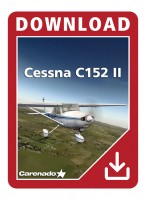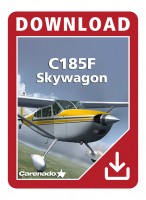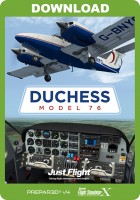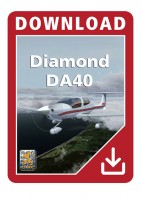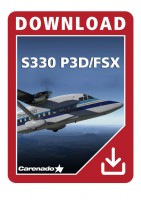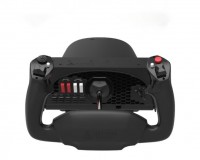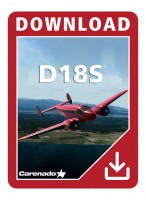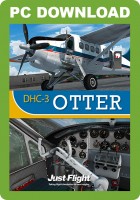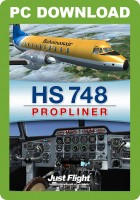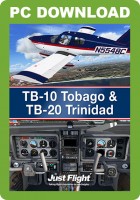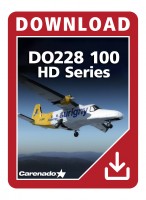Preis inkl. 19% MwSt.
Als Sofortdownload verfügbar
- Artikel-Nr.: AS14877
- Hersteller/Publisher: A2A Simulations
- Sprache: English
- Aktuelle Version: 1.00
The release of the new Accu-sim P-51 “Civilian Mustang” is now available in its P3D V4 guise. Our roots have been in both general aviation and military aviation history, and A2A has used this passion and experience to bring many Warbirds to your flight simulator. However, this release does our best job combining these two worlds. At the break out of World War II, the skies were filled with aircraft developed in the mid to late 1930’s. Aircraft were still transitioning from fabric to all-metal designs, and for the most part, automatic systems management really did not exist. The height of single-engine complexity would be the P-47 Thunderbolt, which had a plethora of systems to manage (manual cowl, cooling, and oil flaps, manual turbo, manual throttle management, etc.). The pilot was being taxed to just fly the aircraft, let alone engage an enemy or avoid being attacked. Over the course of the war, aircraft were made ever more aerodynamic, engine power was pushed to its limit, and systems were gradually made to work automatically.
This version of the Accu-sim P-51D Civilian is for P3D V4/V5 Academic only, please make sure that you have the right matching P3D version.
The P-51 Mustang represents the very pinnacle of this wartime development, and today hundreds of P-51’s fly in a modern world and perform not just adequately, but admirably. The P-51 Mustang today is an outstanding, all weather cross-country platform. It is considerably faster and can fly further than the fast majority of general aviation aircraft, and is just shy of the speed of a personal jet. While maintaining a real Mustang is hobby for the wealthy few, Mustang pilots today regard their aircraft as sturdy and reliable. During the development of the Accu-Sim Mustang over the years, we have taken four test flights in two different Mustangs flying today. The cockpit we designed in this Civilian Mustang was designed over many months with the assistance of Mustang pilots, owners, and our own in-house staff. Owning and operating a Mustang today is a dream to many, and this is what we believe flight simulation is all about. Make your dreams come true.
Features:
- Experience one of the fastest and most powerful propeller driven aircraft in the world today
- IFR cockpit exclusively designed and built from Mustang owners and A2A in-house pilots
- New third-party GPS integration options (Flight 1 GNS 430 and GTN 650 and RealityXP GNS 430)
- As with every A2A aircraft, it is gorgeously constructed, inside and out, down to the last rivet.
- Native Prepar3D v4 dynamic lighting including new cockpit lighting and new rotating beacon
- Designed and built to be flown “By The Book“.
- Visual Real-Time Load Manager, with the ability to load fuel and stores in real-time.
- Naturally animated pilot in authentic gear.
- 3D Lights ‘M’ (built directly into the model) with under-wing landing light than can be turned on, deployed, and retracted and fully functional recognition lights and now taking advantage of the new P3Dv4 platform changes such as Dynamic lights.
- Pure3D Instrumentation now with natural 3D appearance with exceptional performance.
- Sound engineered by A2A sound professionals.
- Oil pressure system models oil viscosity (oil thickness).
- In cockpit pilot’s map for handy in-flight navigation.
- Auto-Mixture that actually performs as intended. Now you can set for “RUN” and the aircraft fuel-to-air ratio will be automatically determined and set by the carburetor based upon various factors, such as altitude.
- Dual speed, dual stage Supercharger modeled with accurate behavior.
- Fuel delivery system simulated.
- All models include A2A specialized materials with authentic metal and taking advantage of the P3Dv4 platform to enable beautiful models like never seen before for the Accu-sim P-51.
- Pilot’s Notes pop-up 2D panel keeps important information easily available.
- A true dual-speed supercharged engine experience.
- Feel the exhilaration of flying an Accu-Sim-powered P-51 Mustang.
- Mach drag built and tested specifically for the P-51D airframe.
- Merlin V-12 liquid cooled V-1650 engine built to manufacturer’s specifications.
- A true propeller simulation.
- Electric starter with accurate cranking power.
- Dynamic ground physics including both hard pavement and soft grass modeling.
- Primer-only starts are now possible. Accu-Sim monitors the amount of fuel injected and it’s effectiveness to start and run the engine.
- Cold mornings require energizing the primer for long 3-4 seconds, and warm starts may only need a second or two.
- Immersive in-cockpit, physics-driven sound environment from A2A engineered P-51 recordings.
- Complete maintenance hangar including landing gear, internal systems and detailed engine tests including compression checks.
- Understand how a high-performance aircraft behaves and see how well you can cope with all of the unexpected things that can happen. No two flights are ever the same.
- Piston combustion engine modeling. Air comes in, it mixes with fuel and ignites, parts move, heat up, and all work in harmony to produce the wonderful sound of a V-12, liquid-cooled racing engine. Now the gauges look beneath the skin of your aircraft and show you what Accu-Sim is all about.
- Airflow, density and it’s temperature not only affect the way your aircraft flies, but how the internal systems operate.
- Real-world conditions affect system conditions, including engine temperatures. Manage temperatures with a radiator flap and proper flying techniques.
- Spark plugs can clog and eventually foul if the engine is allowed to idle too low for too long. Throttling up an engine with oil-soaked spark plugs can help clear them out and smoke.
- Overheating can cause scoring of cylinder head walls which could ultimately lead to failure if warnings are ignored and overly abused.
- Large engined aircraft like the P-51 like to be in the air, not on the ground. So don’t idle for too long, get in the air where the air supply is plentiful
- Engine, airframe, cockpit panel and individual gauges tremble from the power of a high-performance combustion engine.
- Authentic component drag. Dropping your gear will pull your aircraft realistically as the landing gear is deployed along with cooling flaps, ordnance and even opening the canopy. Drop your gear, deploy your flaps, or just try a dive, and listen to your airframe.
- System failures, including flaps that can independently jam or break based on the actual forces put upon them. If you deploy your flaps at too high a speed, you could find yourself in a very dangerous situation.
- Total audible cockpit made with recordings from the actual aircraft. Before you fly, enjoy clicking everything.
- Primer system modeled. Accu-Sim monitors the amount of fuel injected and it’s effectiveness to start the engine. Cold mornings require as many as 12 strokes and warm starts may only need a single shot.
- Authentic battery - The battery capacity is based on temperature. The major draw comes from engine starting.
- Oil pressure system is affected by oil viscosity (oil thickness). Oil viscosity is affected by oil temp and oil dilution level. Now when you start the engine, you need to be careful and not raise RPM too much until oil temp is high enough to give proper oil pressure. If you raise RPM too high on a cold engine, especially very cold, oil pressure can raise to over 150 psi. Oil pump failure can result. Extended inverted flight (negative g) can uncover the oil sump and reduce oil pressure. Do not fly in a negative g situation for more than 5 seconds.
- Oxygen starvation (hypoxia) is modeled - Just take off and climb without oxygen to see.
*This version is for academic users in Prepar3D, in accordance to the Lockheed Martin Prepar3D academic license. This software is to be used for flight simulation only, and not to be used for real world flight training. For real world flight training, use our commercial license which is intended to be used with flight simulators authorized by the FAA while using our software.
Lockheed Martin Prepar3D V4/V5 Academic*
Operating System: Microsoft Windows 10 (64bit)
Processor: Quad Core CPU with 3.5 GHz
Memory: 16 GB DDR4 RAM, 2666 MHz
Graphics card: 4 GB VRAM, DirectX 11
Free disk space: 2.1 GB, SSD highly recommended



.jpg)
.jpg)
.jpg)
.jpg)
.jpg)
.jpg)
.jpg)
.jpg)
.jpg)
.jpg)
.jpg)
.jpg)
.jpg)
.jpg)
.jpg)
.jpg)

